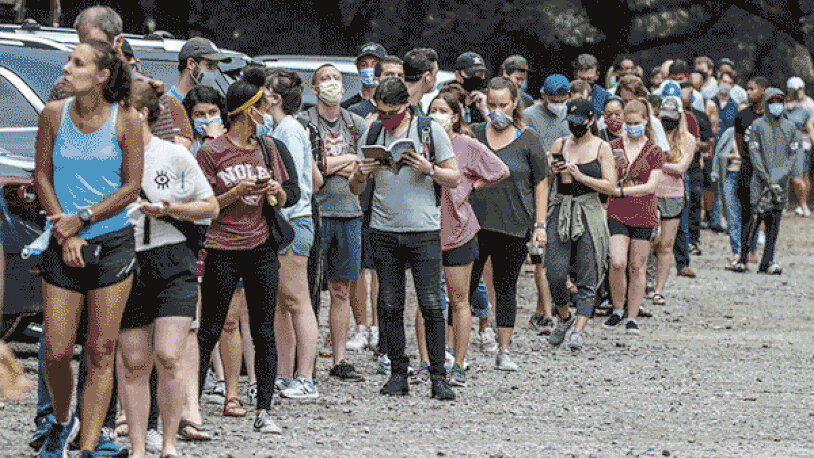
2024 VOTER GUIDE
General Primary May 21, 2024
Voter Registration Deadline is April 22, 2024
Voter Registration Deadline: April 22, 2024
Early Voting: April 29 – May 17, 2024
Mandatory Saturday Voting: May 4 and 11, 2024
Federal Voter Registration Deadline: May 20, 2024
ELECTIONS
This year, voters will select their candidate of choice for the following offices: U.S. President, U.S. House of Representatives, State Senate, State Representative, Georgia Supreme Court Justices, and Georgia Appellate Court Judges. Additionally, there are municipal elections including the City of Atlanta, Fulton and DeKalb counties, as well as statewide ballot measures. For complete details visit the GA My Voter Page.
KEY ELECTION DATES
May 21, 2024: Primary election
June 18, 2024: Primary runoff
November 5, 2024: General election
December 3, 2024: General runoff

WHO’S WHO & WHAT THEY DO
President: Article II of the United States Constitution establishes the executive branch of government. The president of the United States is responsible for implementing and enforcing federal law and serves as commander in chief of the U.S. Armed Forces.
U.S. House of Representatives: Members in the House are called representatives. Voters will elect 14 candidates to serve in the U.S. House from each of the state's 14 U.S. House districts. There are currently 435 representatives, a number fixed by law since 1911.
Georgia State Senate: The upper chamber of the Georgia General Assembly. Legislative authority and responsibilities of the Georgia State Senate include passing bills on public policy matters, setting levels for state spending, raising and lowering taxes, and voting to uphold or override gubernatorial vetoes.
Georgia House of Representatives: The lower chamber of the Georgia General Assembly. Legislative authority and responsibilities of the Georgia House of Representatives include passing bills on public policy matters, setting levels for state spending, raising and lowering taxes, and voting to uphold or override gubernatorial vetoes.
Georgia Supreme Court: Four (4) Georgia Supreme Court justices will expire on December 31, 2024. Justices on the Georgia Supreme Court are elected in nonpartisan elections to serve six-year terms.
Georgia Appellate Court Judges: Six (6) Georgia intermediate appellate court judges will expire on December 31, 2024. Judges on the Georgia Court of Appeals are chosen in nonpartisan elections to serve six-year terms.
School Board Members: School Board Members are elected officials responsible for the oversight of public schools within their district. Their duties include setting and monitoring the educational policy, curriculum standards, and budget allocations to ensure students receive the highest quality education. The county you live in will determine whether you have school board elections this year.
Municipal Officers in Georgia: Municipal officers include mayors, council members, and other city or town officials. They are responsible for governance and administration of their municipalities, focusing on issues like zoning, public safety, community services, and infrastructure. Dekalb and Fulton Counties will have several municipal officials on the ballot this year.
Why Down-Ballot Voting Is Important
It’s Voting Season, and many voters plan to cast a ballot in 2024.
In a typical presidential election year, when barely 50 percent of eligible voters cast a ballot, a third or more of those voting won’t fill out the entire ballot.
While voters don’t have to vote for everything on the ballot to cast a vote, it is vital to vote down the ballot.
Down ballot is where you’ll find the state and local representatives who make policy on local issues – schools, parks, roads, safety, and social services. These services directly impact you, your family, and your community. That impact extends back up the ballot as well. Not voting locally doesn’t just leave essential issues up to a small minority of eligible voters; it can have a huge impact on future national elections in ways that may not seem evident at first.
Vote. Your Power. It’s not just about voting for president but using your voting power to reflect your community's best interest.
ELECTION PROTECTION
If you have any issues at the polls, can’t confirm your polling location, or face any difficulty trying to cast your vote, contact the nonpartisan Election Protection hotline for immediate assistance!
1-866-OUR-VOTE (1-866-687-8683) English
1-888-VE-Y-VOTA (1-888-839-8682) Spanish
1-888-API-VOTE (1-888-274-8683) Chinese,
Vietnamese, Korean, Bengali, Hindu, Urdu, Tagalog
1-844-YALLA-US (8-844-925-5287) Arabic
Learn more about volunteering.
NOT IN THE RIGHT PLACE? FIND YOUR CORRECT LOCATION
If a poll worker tells you that you are not in the correct polling place, they should be able to tell
you the name and address of the correct location.
If they fail to do so, you can confirm this for yourself by visiting, https://www.mvp.sos.ga.gov. You can also check ID requirements and find other voter information by visiting this website.
GETTING HELP: USING A TRANSLATOR OR OTHER ASSISTANCE
Under Georgia law, any voter is able to bring an assistor to the polls with them, if they are unable to use the voting machine, have a disability which may require help, or are in need of translation assistance.
Poll workers cannot turn away your assistor. However, your assistor may not be your employer or a representative of your union.
Your assistor/translator will need to sign an affidavit provided by the county. Your assistor is not allowed to affect your vote.
Please call 1-866-OUR-VOTE if you need language or translation assistance at the polls.
After recent rules, restrictions, and redrawn maps have changed the landscape for voting in Georgia, we continue to fight to ensure that all our voices matter and votes count - that’s why, we’re challenging you to #GetVoteReady ahead of this year’s elections. As always, let’s make sure to:
Tell your Family, Friends & Community to do the same!
Here are the Top 10 Things you need to know about Georgia’s New Voting Law
Passage of SB 202, the so-called Election Integrity Act of 2021, makes several changes to Georgia’s voting laws which may impact the ways you cast your ballot in upcoming elections for local, state, and federal officials. The full 98-page text of the new legislation can be found here, but below you can find a list of the things you need to know to #GetVoteReady today!
+ You must have a valid ID if you plan to vote by mail (absentee ballot).
Instead of relying on your signature to verify your identity, voters will now need to submit a driver’s license number, state ID number or other documentation when both requesting and returning absentee ballots.
+ Early voting hours are changing.
All Georgia voters will be able to vote on two Saturdays before general elections and primaries, but weekend voting hours before runoffs will be reduced. The voting law requires a second Saturday of early voting statewide before general and primary elections. The additional Saturday means Georgia has 16 guaranteed days of early voting before each general or primary election. Sunday voting will remain optional, with county election offices given the authority to decide whether to open voting locations on up to two Sundays. Voting hours are set at 9 a.m. to 5 p.m., and county election officials can choose longer hours, from 7 a.m. to 7 p.m.
+ Drop boxes will only be available at early voting locations.
Georgia’s new voting law allows drop boxes only if they’re located inside early voting locations. They can only be used during in-person voting hours, and they will be shut down when early voting ends the Friday before election day. Each county is required to install at least one drop box, kept under “constant surveillance” by an election official, police officer or licensed security guard.
+ It’s illegal to hand out food and water to voters in line.
Distributing food and drinks to voters within 150 feet of the outer edge of a polling place or within 25 feet of any voter standing in line is punishable as a misdemeanor, which comes with up to a year in jail and a $1,000 fine. Poll workers will be allowed to install self-service water receptacles for voters waiting in line.
+ Earlier absentee ballot deadlines.
The window to request absentee ballots begins later and ends sooner. Previously voters could request absentee ballots 180 days before election day. This year voters will be unable to request absentee ballots until 78 days before election day. The last opportunity to return an absentee ballot application is 11 days before election day.
+ Voting buses are banned.
Voting buses are to only be used in the event of an emergency as determined by the governor in polling places affected by disasters such as storms or power outages.
+ Provisional ballots cast in the wrong precinct won’t count.
Previously when voters showed up at the wrong county polling place they were permitted to cast a provisional ballot. Any provisional ballots cast in the wrong precinct will now be disqualified - with the exception of ballots cast after 5pm on election day when voters have less time to drive to their designated polling location.
+ Mass mailings of absentee ballot request forms are restricted.
Under the law voting organizations are only allowed to send absentee ballot applications to Georgians who haven’t already requested a ballot or voted. This will require organizations to check public election records to ensure they aren’t sending repeat requests or face a $100 fine for each duplicate absentee ballot processed by county election officials.
+ Unlimited challenges to voter eligibility are allowed.
Any voter can challenge the eligibility of as many voters in their county or city as they wish. Challenges must be made in writing and specify the grounds for the challenge. For example, a voter in Fulton County could challenge all the county’s 860,000 voters if he or she chooses to do so.
+ Long lines could result in more voting sites opening.
If voters have to wait in line for more than an hour before checking in to vote in a general election, county election officials will have to reduce the number of voters assigned to that precinct to no more than 2,000. In the event of this happening counties would have to open additional voting sites or reassign voters. Precinct managers are required to measure wait times three times per day on election day. This new rule only applies to general elections.
Stay Connected!
Sign up here for up to date information about Georgia’s election laws and changes to voting processes in our state.
How Georgia’s voting law works
Senate Bill 202 makes substantial changes to elections in Georgia, a state with a long history of denying Black residents the right to vote.
Voting laws: How Georgia compares to other states
Georgia’s expansive voting law changes the rules of elections in many ways, making it harder to cast an absentee ballot, shifting early voting days and overhauling how elections are run.
Judge strikes down part of Georgia voting law that banned photography
A federal judge ruled against a broad ban on photographing voted ballots Friday, throwing out a part of Georgia’s new election law while allowing the rest of it to stand.
5 State Laws Based on Voter Fraud Myths that Will Hamper Future Elections
The plot to overturn the 2020 election failed, but false claims about voter fraud have successfully fueled legislation that will make it harder to vote.
A newly passed bill that gives Georgia’s top law enforcement agency unfettered power to pursue any allegations of election fraud sets a troubling precedent for future elections, some election administration officials contend.
The Georgia General Assembly approved a bill Monday that would give the GBI stronger police powers over elections by authorizing the statewide agency to launch investigations into allegations of fraud.
Spread the word and help your family and friends
#GetVoteReady. Download and Share!
















